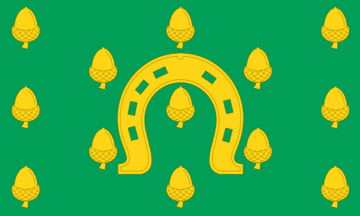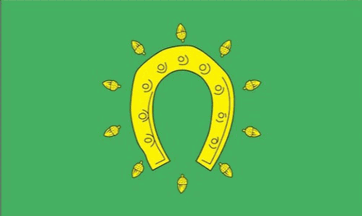 image by Pete Loeser, 18 January 2021
image by Pete Loeser, 18 January 2021Based on this photo of the flag.

Last modified: 2021-01-23 by rob raeside
Keywords: rutland | horseshoe | acorns | england |
Links: FOTW homepage |
search |
disclaimer and copyright |
write us |
mirrors
 image by Pete Loeser, 18 January 2021
image by Pete Loeser, 18 January 2021
Based on this photo of the flag.
On this page:
Rutland is a landlocked county in the East Midlands of England, bordered by Leicestershire, Lincolnshire and Northamptonshire. Its is only 18 miles wide and 17 miles long. It is the smallest historic county in England. It only has two towns: Oakham is the county town, or county seat, and Uppingham the other town.
Although the name Rutland possibly pre-dates the Norman Conquest, its first written record is as "Roteland" in the will of Edward the Confessor, and during the reign of King John it was assigned as a dowry to Queen Isabella. Throughout its history it has been passed like a political basketball between neighbouring shires, especially
Nottinghamshire and Leicestershire.
The office of High Sheriff of Rutland was instituted in 1129, and there has been a Lord Lieutenant of Rutland since at least 1559. The Earl of Rutland (a member of the Manners family) was elevated to the status of Duke in 1703 and his family seat was in Belvoir Castle in Leicestershire.
By the time of the 19th century Rutland had been divided into the hundreds of Alstoe, East Rutland, Martinsley, Oakham and Wrandike. In 1972 Rutland become a single a non-metropolitan rural district within the administrative county of Leicestershire, but was re-established as a unitary county with its own council in 1998.
It is a beautiful county located around Rutland Water, a large artificial reservoir that acts as an important nature reserve serving a wintering site for wildfowl and a breeding site for ospreys. Rutland's older cottages are built from limestone and ironstone and many still have roofs of Collyweston stone slate or thatch.
Pete Loeser, 18 January 2021
This Monday the Times of London carried an article on the restoration of old counties in the United Kingdom. Specifically, it focused on the county of Rutland, the smallest in the country, it was said. The restoration of Rutland was to be celebrated by a flag-hoisting ceremony (and much more in addition). Here is a quotation from the article:
Source: Ian Murray: "Thinking small on the road to independence", The Times, 31 March 1997.A green banner emblazoned with a golden horseshoe in a ring of acorns will be hoisted proudly tomorrow to show that the smallest county in England has been officially restored to the map.
The horseshoe has been the symbol of Rutland at least since William the Conqueror gave the 125-square-mile estate to Baron Henri de Ferrers, whose family gave its name to farriers. One of his privileges was to claim the forfeit of a horseshoe from anyone of rank visiting his lordship in Oakham, where the castle has a collection presented by monarchs and lords dating back to the 15th century. The custom persists to this day and proud Raddlemen, as natives are known, point to it as proof that they are a race apart.
The flag-raising ceremony will mark the end of 23 years of overlordship by neighbouring Leicestershire, into which Rutland was forcibly incorporated in 1974. Under the leadership of Sir Kenneth Ruddle, the brewing magnate, the tiny county had fought off two previous postwar attempts to abolish it, but its defences crumbled before the bureaucratic logicality of Lord Redcliffe-Maud when he redrew shire boundaries.
The flag of Rutland county council is based on the coat of arms. The descriptions of these are: Arms: Vert, semée of acorns, a horseshoe Or; Crest: on a wreath of the colours, in front of a horseshoe an acorn Or, leaved and slipped proper; Motto: Multum in parvo. The arms were granted on 1 May 1950.
Pascal Vagnat, 3 April 1997
The flag, an armorial banner of the local council, has now been registered by the Flag Institute as the County Flag of Rutland, following the decision of the council to release the banner to the public (source).
Jason Saber, 21 November 2015
The golden horseshoe on green has been the traditional emblem of the county since at least 1784. The horseshoe refers to a tradition where dignitaries traveling through the county are compelled to deliver a horseshoe to Castle Hall in the county town of Oakham. The semy of acorns that was included as part of the 1950 College of Arms grant to the county council is a reference to Rutland's small area. On 9 November 2015 the county council agreed to waive the copyright of this design and allow for it to be a freely flyable and publicly useable flag.
![[Rutland]](../images/g/gb-e-rut2.gif) image by Pete Loeser, 18 January 2021
image by Pete Loeser, 18 January 2021
The flag of England's smallest county, Rutland, was registered in 2015. The design is a banner of the arms in a ratio of 3:5, but is also sold in the traditional English ratio of 1:2, sometimes also in a darker forest green as illustrated here.
Pete Loeser, 18 January 2021
![[Rutland]](../images/g/gb-e-rut-v2.gif) image located by Pete Loeser, 18 January 2021
image located by Pete Loeser, 18 January 2021
The tradition of representing the Rutland county by a golden horseshoe on a green background was used in this proposed design by the Association of British Counties given to the High Sheriff of Rutland in 1997. The High Sheriff duly consulted the local county council, who later added to this design the golden acorns to symbolize the extensive forest that once covered much of the county and in the name of the county town, Oakham. The council realizing that Rutland was not included on the Flag Institute registry, concluded that it would release its banner of arms, its coat of arms in flag form, for general use to represent the county.
Notice the horseshoe is depicted with four nails on one side of the shoe and three on the other, and that the horseshoe is displayed tips down. The standard English practice is to attach horseshoes with seven nails and local tradition is to hang horseshoes that way, at least in Oakham Castle, so "the devil cannot make a nest at the bottom." (This runs counter to the
common practice where the opposite is true. Horseshoes are hung, often over doorways, open side up to keep the luck inside.)
Source: British County Flags: Rutland
Pete Loeser, 18 January 2021
 image by Pete Loeser, 18 January 2021
image by Pete Loeser, 18 January 2021
Based on this photo of the flag.
A simplified flag is for sale at The England Store.
Aleksandar Nemet, 9 October 2009
Before the official version of a Rutland county flag was registered with the Flag Institute this interesting version of the Rutland flag was sold commercially. The English County Flags website describes it as "a rather cartoonish version of the flag...a very poor realisation of the horseshoe and acorns."
Source: British County Flags: Rutland
Pete Loeser, 18 January 2021
![[Rutland]](../images/g/gb-e-rut-coa.gif) image located by Pete Loeser, 18 January 2021
image located by Pete Loeser, 18 January 2021
This coat of arms was officially granted the Rutland County Council in 1950. "The green shield represents the County's agriculture, especially its rich pasture land and the acorns exemplify the former forest land which at one time covered much of the County, especially on the south side. The horseshoe represents the County's history and hunting association, and recalls the unique collection of horseshoes presented by royalty, peers of the realm, and noblemen passing through the County, which hang on the walls of the famous Castle Hall at Oakham."
![[Rutland]](../images/g/gb-e-rut-cc3.gif)
![[Rutland]](../images/g/gb-e-rut-cc2.gif)
images located by Pete Loeser, 18 January 2021
These are examples of the Rutland County Council's logos used on their publications both online and off. Generally they use their coat of arms with identifying text. Included is a more modern example however.
Pete Loeser, 18 January 2021
![[Rutland]](../images/g/gb-e-rut-cc1.gif)
![[Rutland]](../images/g/gb-e-rut-cc4.gif)
images located by Pete Loeser, 18 January 2021
![[Rutland]](../images/g/gb-e-rut-com.gif) image by Pete Loeser, 18 January 2021
image by Pete Loeser, 18 January 2021
image inspired by this photo.
This drawing is based on a photo of a flag looking like somebody placed a badge on the traditional Saint George's Cross flag of England. I submit it because it was a common practice of some flag manufacturers to make these variant flags for English counties not having flags before the Flag Institute Registry was established. They were popular with sports fans and tourists, but never officially recognized.
Pete Loeser, 18 January 2021
![[Street Protest Flag of Rutland]](../images/g/gb-e-rut-pro.jpg) image by Pete Loeser, 18 January 2021
image by Pete Loeser, 18 January 2021
A variant of the flag of Rutland was used by Oakham protesters opposed to the council's plans to make a one-way road system through the county town. It only showed two opposing acorns to the right of the bottom of the horseshoe instead of the usual 13 strewn across the flag while maintaining the association to the county with the golden horseshoe. The gold text "OAKHAM" and "Keep 2 Way" is centred in the horseshoe.
Pete Loeser, 18 January 2021